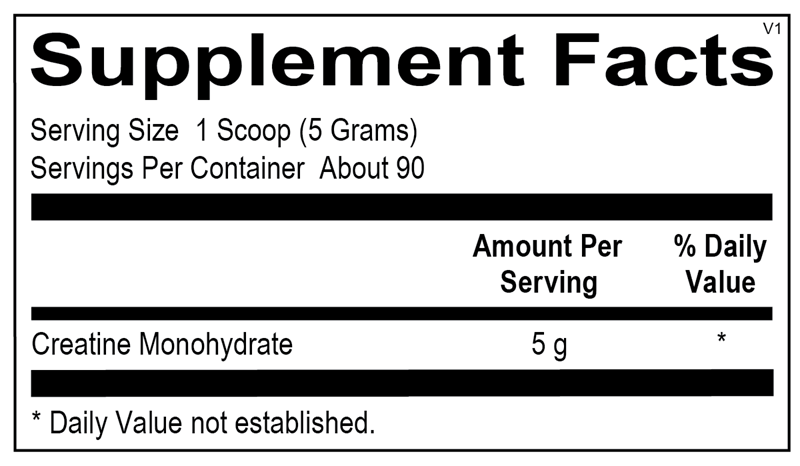Shop Now /
Creatine
Sku: 469090
.tmb-media470.png?Culture=en&sfvrsn=c8ffcd46_7)

Creatine is one of the most extensively researched nutrients in sports and clinical nutrition, recognized for its broad benefits beyond athletic performance. As a naturally occurring compound critical for rapid energy production, creatine supplementation has been shown to enhance strength and endurance, accelerate recovery, support cognitive performance, and promote healthy aging.
Categories:
New, Musculoskeletal Health
Clinical Applications
- Enhances Muscular Performance, Endurance and Recovery
- Boosts Muscle Protein Synthesis and Lean Body Mass
- Promotes Longevity and Healthy Aging
- Supports Optimal Cognitive Function
Derived from amino acids, creatine is a naturally occurring compound that plays a key role in the body’s ability to produce energy. Roughly 95% of the body’s creatine is stored in skeletal muscle tissue, with a higher concentration in fast-twitch, type II muscle fibers. Within the muscles, creatine exists in two main forms—approximately two-thirds are stored as phosphocreatine (PCr), while the remaining one-third remains as free creatine. PCr serves as a rapid energy reserve, helping regenerate adenosine triphosphate (ATP) especially during bursts of physical activity. Creatine is produced endogenously at an amount of about 1 g per day. Synthesis predominately occurs in the liver, kidneys, and to a lesser extent, the pancreas. The remainder of the creatine available to the body is obtained through the diet at about 1 g per day in an omnivore diet. Dietary sources of creatine include animal-based proteins, notably red meat and fish. Approximately 1–2% of intramuscular creatine is broken down and excreted through the urine each day. Supplemental creatine has been shown to enhance athletic performance and recovery, promote longevity and healthy aging, and support optimal cognitive function.
Suggested Use:
Mix 1 scoop (5 g) with 8 ounces of water or your preferred beverage per day or as recommended by your health care professional.
Athletic Performance and Recovery
Creatine monohydrate is one of the most extensively studied ergogenic aids in sports nutrition. Mechanistically, supplemental creatine increases intramuscular PCr stores, enhancing the cellular capacity to rapidly regenerate ATP during physical exertion. It may also exert osmotic effects that promote cell hydration and signaling, and it enables greater training volume and intensity which in turn stimulates muscle protein synthesis and hypertrophy. The net result is a well-documented improvement in anaerobic performance parameters—creatine consistently increases maximal strength and power output, muscular work capacity, and lean body mass gains during resistance training. Creatine supplementation combined with resistance training has been shown to increase lean body mass in adults of any age.
In addition to its benefits with muscle performance, there is evidence that creatine supplementation enhances exercise recovery and reduces muscle lysis secondary to exercise. Studies report that creatine users experience less muscle enzyme release and soreness after intense exercise, indicating reduced muscle fiber lysis.
Cognitive Function
Creatine has also been studied for its neuroprotective and nootropic potential. Neurons and glial cells use PCr to maintain energy homeostasis, especially during cognitively demanding situations or metabolic stress. Research shows creatine can stabilize mitochondrial function, reduce reactive oxygen species, and prevent ATP depletion. These cognitive benefits are attributed to creatine’s capacity to bolster ATP availability in the brain, essentially “fueling” the neural circuits during demanding tasks. Recent research demonstrated that a bolus dose of creatine (0.3–0.4 g/kg) given to sleep-deprived volunteers was able to improve their cognitive performance and mood relative to placebo. In a landmark 2024 study, creatine acutely elevated brain PCr levels, resulting in better performance on tests of reaction time and working memory despite the lack of sleep. These results challenged the previous understanding that creatine only enhanced cognitive performance after long-term intake.
Healthy Aging
A decline in cognitive and physical health is considered a normal evolution of aging. The progressive loss of muscle mass, strength, and function is a major geriatric concern due to the consequential increase in falls and injuries that accompany muscle loss. Resistance exercise is the cornerstone intervention for muscle loss, and creatine supplementation has emerged as a valuable adjunct for older adults. Creatine supplementation combined with resistance training promotes greater muscle volume development than resistance training alone in older populations. For example, one meta-analysis in adults over 50 found creatine users averaged 3 lb more lean mass gain and notable strength increases over 12–24 week training periods versus those that do not supplement with creatine.
Additionally, emerging evidence suggests supplemental creatine combined with exercise may aid bone maintenance. In older men, 10–12 weeks of creatine plus whole-body resistance training increased upper-limb bone mineral content and reduced markers of bone resorption compared to placebo. Furthermore, a 12-month randomized control trial in postmenopausal women found that adding creatine during a resistance training program preserves femoral neck bone mineral density and increases femoral shaft subperiosteal width, a predictor of bone bending strength.

Creatine
Sku: 469090
Creatine is one of the most extensively researched nutrients in sports and clinical nutrition, recognized for its broad benefits beyond athletic performance. As a naturally occurring compound critical for rapid energy production, creatine supplementation has been shown to enhance strength and endurance, accelerate recovery, support cognitive performance, and promote healthy aging.
Categories:
New, Musculoskeletal Health
Clinical Applications
- Enhances Muscular Performance, Endurance and Recovery
- Boosts Muscle Protein Synthesis and Lean Body Mass
- Promotes Longevity and Healthy Aging
- Supports Optimal Cognitive Function



